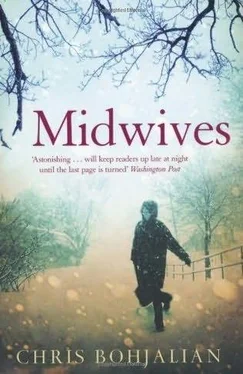Chris Bohjalian - Midwives
Здесь есть возможность читать онлайн «Chris Bohjalian - Midwives» весь текст электронной книги совершенно бесплатно (целиком полную версию без сокращений). В некоторых случаях можно слушать аудио, скачать через торрент в формате fb2 и присутствует краткое содержание. Жанр: Современная проза, на английском языке. Описание произведения, (предисловие) а так же отзывы посетителей доступны на портале библиотеки ЛибКат.
- Название:Midwives
- Автор:
- Жанр:
- Год:неизвестен
- ISBN:нет данных
- Рейтинг книги:5 / 5. Голосов: 1
-
Избранное:Добавить в избранное
- Отзывы:
-
Ваша оценка:
- 100
- 1
- 2
- 3
- 4
- 5
Midwives: краткое содержание, описание и аннотация
Предлагаем к чтению аннотацию, описание, краткое содержание или предисловие (зависит от того, что написал сам автор книги «Midwives»). Если вы не нашли необходимую информацию о книге — напишите в комментариях, мы постараемся отыскать её.
Midwives — читать онлайн бесплатно полную книгу (весь текст) целиком
Ниже представлен текст книги, разбитый по страницам. Система сохранения места последней прочитанной страницы, позволяет с удобством читать онлайн бесплатно книгу «Midwives», без необходимости каждый раз заново искать на чём Вы остановились. Поставьте закладку, и сможете в любой момент перейти на страницу, на которой закончили чтение.
Интервал:
Закладка:
For a second I considered flipping through the pages with my fingertips wrapped in Kleenex, but then I remembered the pages were already covered with my fingerprints from the week before. And so I decided I would only bother with tissue when I pressed down hard on the metal tabs at the top and the bottom of the binder that would release the key pages.
Tom had offered to go with us, but I was glad I'd said no. I felt bad enough about what I was doing; I wouldn't have wanted to involve anyone else.
I was shaking as I worked, a precursor of sorts to the trembling I'd experience while we awaited the verdict. I wasn't sure what law I was breaking, but I knew what I was doing was illegal. And I knew what I was doing was wrong.
When I returned to Patty's car I was still shuddering. I dropped the three notebooks onto the floor below the glove compartment and pushed them to the side with my feet as I climbed in. Five loose sheets of paper, folded down to the size of a paperback book, were pressed flat against my stomach, hidden under my blouse and my sweater and my jacket.
"Is that everything?" Patty asked, glancing down at the notebooks on the floor mat.
"That's everything," I said, the first of at least three times I can recall that I told that particular lie.
By the time we returned, my mother had completed her testimony and the court had recessed. Before taking the binders with him into his chambers, the judge told us he would let us know by one-thirty or two whether we could all go home for the day or whether the trial would resume midafternoon. If we were told to go home, it meant he was probably going to allow some or all of the notebooks, and Stephen and Bill Tanner would be granted a day to examine the entries; if we were asked to remain, it meant the judge had decided nothing in the notebooks was relevant and the State would not be allowed to see them.
Stephen was prepared to lose: He was prepared to lose both on the specific issue of the notebooks, and I think he was prepared to lose the case. He knew what my mother had written in March and-perhaps-early April: He probably knew that it only got worse.
And I think my mother was ready for defeat as well. I didn't believe at the time that my mother had slipped on the stand with the conscious hope that it would ensure a conviction-and even today I don't think she hoped for one on an unconscious level-but I think she had become resigned to that inevitability. Given the guilt in her own mind, she must have viewed her notebooks as all the evidence the State needed to convince the jury she had killed a woman in labor.
The difference in my mother's and Stephen's attitudes, if there really was one, is that Stephen still had some fight left in him. He was prepared to appeal a decision that allowed any part of the notebooks as evidence, and he was already modifying his strategy for his expert witnesses: It didn't matter whether Sibyl Danforth thought Charlotte Bedford was dead or alive, because Sibyl was merely a midwife. Our obstetric experts and forensic pathologists were positive, based on their years and years of medical experience, that the woman was dead by the time my mother made her first cut.
The principal issue he would have to overcome was my mother's testimony itself. Carefully he had elicited from her the idea that she had done everything she could to see whether Charlotte Bedford was dead, without ever having her say categorically that she was sure beyond doubt that the woman had died. That part of the transcript has become for me a small study in legal ethics:
HASTINGS: Did you check one last time to see if the woman had a pulse?
DANFORTH: Yes.
HASTINGS: Did you hear one?
DANFORTH: No.
HASTINGS: Did you check one last time to see if she had a heartbeat?
DANFORTH: Yes, absolutely.
HASTINGS: And did you hear one?
DANFORTH: No, I did not.
HASTINGS: You did everything possible to make sure the woman was dead?
DANFORTH: Oh, yes.
My mother hadn't lied, but if the notebooks were allowed, it would look to the jury as if she had, and not even Stephen Hastings's experts would be able to restore her credibility.
Consequently, our lunch was an extremely quiet affair, and even Patty Dunlevy was subdued while we awaited Judge Dorset's ruling. Occasionally my father or Stephen would try and bolster my mother's spirits as they had in the days immediately before the trial started, and once or twice Peter Grinnell tried to include Tom-who, despite everything else on her mind, my mother had somehow remembered to invite to lunch-in the conversation by asking him about school. But most of the time everyone sat around the wooden restaurant table in silence.
While the fears of the adults around me began and ended with the issue of whether Judge Dorset would allow the notebooks to be admitted as evidence, I had an additional worry as we ascended the stairs to the third-story courtroom to hear the judge's ruling. I was afraid he had discovered that pages were missing, and in a voice filled with fury and disgust he would ask Stephen or me what we had done with them. Throughout lunch and as we walked back to the courthouse, I had been sure that everyone around me heard the papers rustling beneath my clothes every time that I moved, and I was convinced the moment the judge saw me that he would be able to tell I was responsible.
When I'd gone to the bathroom at the restaurant, I'd considered ripping the pages to shreds and flushing them down the toilet, but I was afraid: If the judge discovered they were missing and insisted that they be presented, their continued existence might be my only hope for clemency. But as we wandered near the ladies' room at the courthouse, the idea crossed my mind once more to destroy them, and I told my parents I had to go to the bathroom and I would catch up with them in the courtroom in a minute.
Tom asked me if I was feeling okay, and I told him I was fine.
In the courthouse bathroom, however, I was again unable to bring myself to dispose of the notebook pages, although this time it was not merely a fear of the judge that prevented me. At some point, I assumed, my mother would get her notebooks back: Although it was unlikely I could ever press the folds from the pages and replace them in the diaries before she noticed they were missing, at the very least I could still return them to her. Someday, I imagined, she would forgive me for reading them-especially, I reasoned, if by some miracle she was acquitted.
But I did read the pages once more in that bathroom, and as I did I reassured myself that I was making the correct decision: I had to do everything I could to protect my mother and preserve our family.
Besides, my mother's conviction would not bring back Charlotte Bedford. It would merely destroy a second woman.
The jury was not present when Judge Dorset issued his ruling, but most of the spectators had reassembled.
None of us, of course, could see Stephen's or my mother's expressions when he spoke, but I assume if the spectators envisioned anything at all on their faces, they envisioned only relief: The judge ruled that there was nothing in the diaries that was relevant to my mother's testimony specifically, or to the case in general. The notebooks were a personal account of her life but had little relevance to the issues under examination and would therefore not be shared with the State.
Did Judge Dorset-who could stare directly into Stephen's and my mother's faces-see that in addition to relief there had to be surprise? He was an intelligent man, so I'm sure he did. I'm sure he saw disbelief in their eyes: My mother knew exactly what she had written at different points over the last seven months, and they both knew what she had written on March 15.
My mother and Stephen must have thought they had been given-inexplicably, and without reason-an astonishing gift from the judge, a gift that grew tangible when a court officer carried the three blue binders to the defense table and handed them over to my mother. A moment later the jury was brought back into the courtroom, my mother was returned to the stand, and Bill Tanner began his cross-examination.
Читать дальшеИнтервал:
Закладка:
Похожие книги на «Midwives»
Представляем Вашему вниманию похожие книги на «Midwives» списком для выбора. Мы отобрали схожую по названию и смыслу литературу в надежде предоставить читателям больше вариантов отыскать новые, интересные, ещё непрочитанные произведения.
Обсуждение, отзывы о книге «Midwives» и просто собственные мнения читателей. Оставьте ваши комментарии, напишите, что Вы думаете о произведении, его смысле или главных героях. Укажите что конкретно понравилось, а что нет, и почему Вы так считаете.











